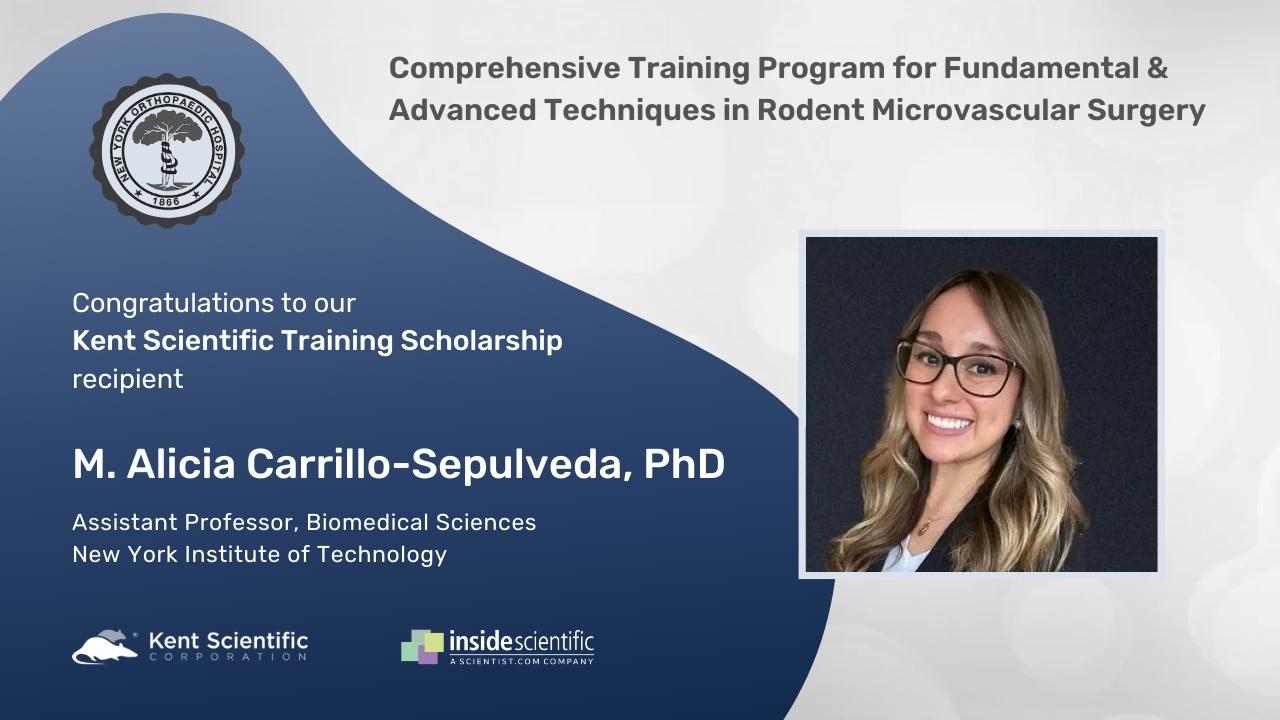Meet Alicia Carrillo-Sepulveda, Vascular Physiologist and Rodent Microvascular Surgery Scholarship Recipient

Alicia Carrillo-Sepulveda, PhD, is a vascular physiologist with training from prestigious institutes in Brazil and the United States. Her career began in the clinical setting, as she initially worked as a practitioner nurse specialized in cardiology. After spending more than five years at the Heart Institute at the University of São Paulo, one of the largest cardiology hospitals in South America, Alicia pursued a PhD at the same university and studied how thyroid hormones affect the vascular system. For her subsequent postdoctoral training in the United States, Alicia investigated the mechanisms of blood pressure during vascular complications of diabetes.
Eventually, Alicia settled down in New York, where she gained a faculty position at the Institute of Technology and established an independent research program in vascular function and metabolism. Currently, her lab is working on understanding the mechanisms by which metabolic stressors negatively impact the vascular system. In particular, Alicia is investigating how metabolic diseases like obesity and type 2 diabetes affect vascular function and integrity, as individuals with these diseases have a high chance of developing hypertension.
Alicia recently won a Kent Scientific scholarship for the Comprehensive Training Program for Rodent Microvascular Surgery at Columbia University! We sat down with Alicia to get an understanding of her motivation for applying to this scholarship, what she hoped to learn from this workshop, how these skills will help her conduct her research, and more.
What was your motivation for applying to this scholarship?
I was very excited when I saw this workshop because I saw it as an opportunity for me to enhance my fine motor skills, which are very important for my research. I read about the course content and I was very excited to receive training from experts in the field. I have not seen many courses like these in my field, so I was excited to give it a try.
What did you learn in this surgical training workshop?
Well, I learned a lot. I learned microsurgeries in small animals, from basic procedures to those more related to the microvascular system. I learned how to better dissect those small vessels, arteries, and veins in the whole mouse body, and how to cannulate those vessels, which is very tricky due to their size. I also learned how to implant pressure catheters, which is very important for my research.
“I think the main thing that I learned was how to act during the surgery when something goes wrong.”
We know the surgical technique, but we really need more training to overcome those difficult moments. For example, the vessels can bleed a lot and cause you to lose the animal. This is one of the things that I’m really happy to have learned during this course.
What type of anesthesia did you use?
I used isoflurane and I had the opportunity to work with the Kent anesthesia setup, which I was not familiar with before. Even though I’ve used isoflurane in the past, I worked with different systems.
“I was really happy because the setup for the Kent anesthesia [system] is quite small, so they fit in any small space that you might have in your animal lab.”
The system is very practical, and it was very easy to set up and use. An advantage of this system is that during the surgery, when the animal is under anesthesia, you can monitor heart rate, temperature, and oxygen at all times. I really liked this system, and I think it allows for good control during surgery.
What skill was the most difficult to learn?
Actually, the most difficult thing is to keep calm and not panic. You really should not panic, and to have control during the surgery and to overcome difficult situations, you need to look at what’s going on, keep calm, and act fast.
“In my experience during the course, one of the procedures that I was trying didn’t [go] the way I planned.”
My first reaction to this situation was to panic. I was lucky that Dr. Yelena Akelina, the workshop instructor, was there to show me exactly what to do and how to overcome this problem. I also really learned how to follow all these surgical steps and the importance of not skipping them in having a successful procedure. This is the takeaway from this course: pay attention to all of the details during the surgery and don’t skip any steps. It’s important to be consistent with the surgery that you are doing.
How will these new skills help you with your research?
It will definitely help me very much. With molecular or cell culture experiments, you should be consistent and follow all of the protocols. The same is true for surgery: you need to be consistent with your surgical techniques to have consistent, reproducible results. This course taught me a lot about consistency and how important every single step is to a successful microsurgical procedure, and that will definitely translate to my research. I will be able to reproduce the model that I use, as well as the data that I am generating in the lab.